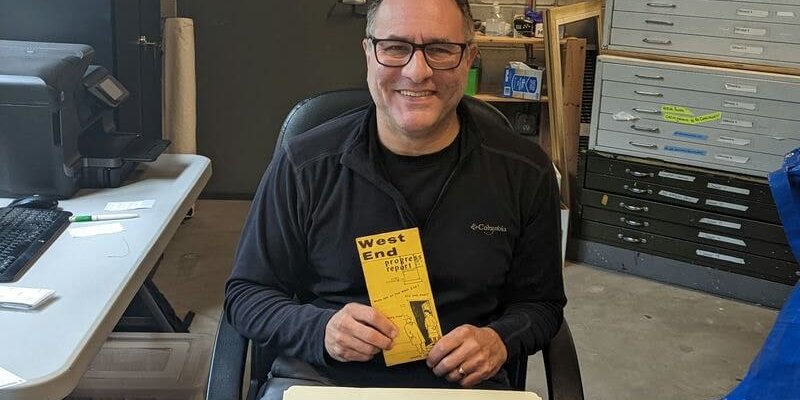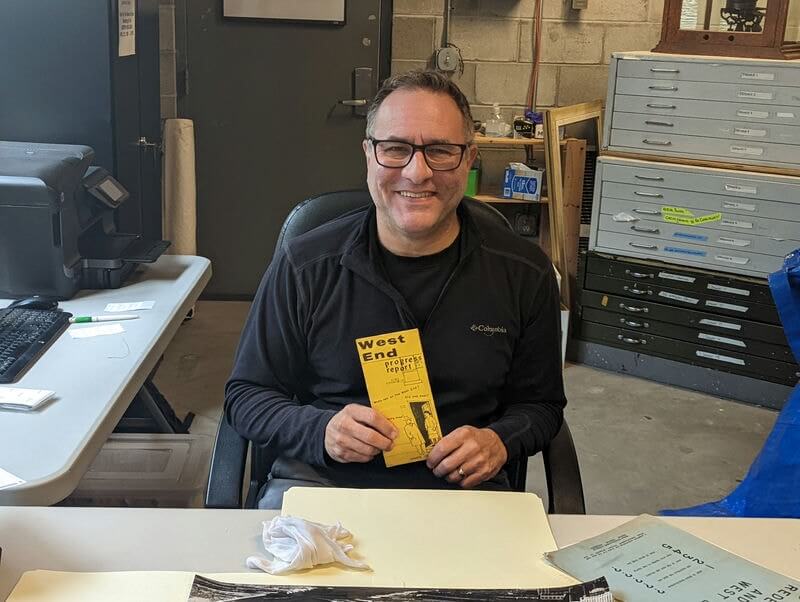New Collections Manager Bob Potenza Digs WEM’s Artifacts
On most days, you can find Bob Potenza digging through boxes of artifacts—relics of the old West End neighborhood nearly erased by Boston’s infamous urban renewal project of the 1950s and 60s.
“We have trophies from the West End House, shoe shine boxes, even masonry and plumbing from old West End buildings,” said Potenza, who was recently hired as The West End Museum’s full-time Archivist and Curator. He started at the Museum as a volunteer in July 2021.
Potenza served his country as a US Army aviation officer in the first Gulf War. He later worked at UPS and IKEA. He and family lived in Sweden for several years where he helped IKEA design and receive new technology.
The Archives
The WEM’s archives are stored in a 20 x 30-foot room one floor above the Museum on Staniford Street. Luckily, most of the historic items survived the flood that has closed The WEM as it undergoes extensive repairs.
Potenza recently earned his Master’s in History with a concentration in Archives. In fact, he wrote his final project on The WEM’s archives, assessing the collection and making recommendations for it moving forward.
The WEM’s archives are fairly extensive, according to Potenza.
“If you put all the boxes side by side, it would measure about 250 linear feet,” he said. “There are more than 1500 photographs, 196 editions of the West Ender newsletter, thousands of memory letters written by former West Enders and about 100 oral and video histories. We have a lot of contemporary and antique maps of the West End and Boston, too.”
Potenza’s favorite item in the archive?
“We have the original pamphlet that the city of Boston sent to the residents of the West End informing them about the project that would eventually destroy their neighborhood. It’s just a trifold pamphlet, almost comical in its simplicity especially when you compare it to the impact it had on people’s lives.”
What's Next
Potenza started his work by dusting off boxes and consolidating materials. “We’ve been able to create collections that are subject focused; West End schools, West End businesses, West End genealogy.”
His goal is to make the collection more accessible to the public. Right now, people and organizations can call the Museum and request information.
“We’re applying for a grant that will allow us to update Past Perfect (a software program) to put the archives online.”
Potenza, who is 59, grew up in Dorchester and remembers driving past the “If you lived here, you’d be home now” sign on Storrow Drive that marked Charles River Park, the sprawling, luxury apartment community that replaced the neighborhood’s old tenement walk-ups. “I had a loose connection to the West End and didn’t really know about the old neighborhood.
“It’s a fascinating place from the time it was settled until now—from being a stepping stone for immigrants through the urban renewal project. And the story keeps going. We have a whole new generation of West Enders. It’s such a dynamic place, it really is.”
You can reach Potenza by email at: bob@thewestendmuseum.org.



